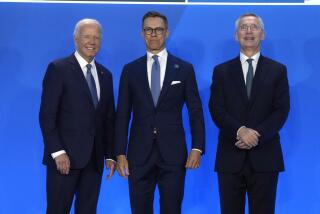Allies Urge Quick Senate Approval of Arms Pact
- Share via
BRUSSELS — NATO foreign ministers, angered at American conservatives who claim that the intermediate-range nuclear forces treaty would undermine European defenses, urged Friday that the Senate give speedy ratification to the newly signed pact.
Meeting less than 24 hours after the end of summit talks between President Reagan and Soviet leader Mikhail S. Gorbachev, the North Atlantic Treaty Organization foreign ministers officially endorsed the INF treaty and hailed “a more forthcoming Soviet attitude” which could produce a new era of East-West detente.
Lord Carrington, secretary general of the organization that joins the United States, Canada and 14 European democracies, said there is “full support of the alliance governments for early ratification” of the treaty which will ban ground-launched nuclear missiles with ranges of 300 to 3,000 miles. Most of the world’s missiles in that class, numbering more than 2,600, were intended for use in Europe.
Agreement Signed
The foreign ministers of the five nations where U.S. intermediate-range missiles were in the process of being deployed joined Secretary of State George P. Shultz in signing an agreement authorizing Soviet monitors to conduct verification operations in their countries. Without the permission of Britain, West Germany, Italy, Belgium and the Netherlands for the inspections, the treaty would have been null and void.
As he signed the document, West German Foreign Minister Hans-Dietrich Genscher said, “It is our duty to allow this inspection on our territory.”
Shultz, who flew to Brussels to report to the allies immediately after saying goodby to Gorbachev, said he planned to collect statements from Western European leaders to submit to the Senate during ratification hearings for the treaty.
“My European colleagues take particular umbrage at Americans who claim to speak for Europe in criticizing this treaty,” Shultz said.
Conservative critics of the treaty maintain that it would endanger Europe by reducing NATO’s nuclear deterrent in the face of overwhelming advantages in conventional arms by the Soviet-led Warsaw Pact.
The opponents include several candidates for the Republican presidential nomination, including Shultz’s predecessor, former Secretary of State Alexander M. Haig Jr., who was NATO’s military commander a decade ago. Gen. Bernard W. Rogers, commander of NATO forces until he was replaced earlier this year, is also a determined foe of the treaty.
But Shultz was given a triumphant welcome by his NATO colleagues. In a burst of self-congratulation, the official NATO communique said the treaty “is the successful result of solidarity and resolve shown by the alliance as a whole.”
The foreign ministers, who serve as NATO’s chief political governing body, also said the time appears to be ripe for additional cuts in East-West arsenals, both nuclear and conventional.
“Notwithstanding the continuing fundamental differences between the states of East and West, we note a more forthcoming Soviet attitude, which could lead to real progress in East-West relations, especially in the field or arms control,” the communique said.
The foreign ministers endorsed the U.S. negotiating priorities, beginning with efforts to cut in half the superpower arsenals of long-range strategic nuclear weapons.
Simultaneously with these strategic arms reduction talks, the ministers called for negotiations among all members of NATO and the Warsaw Pact on reducing conventional and chemical weapons.
Only after conventional imbalances have been eliminated and chemical weapons have been banned, the foreign ministers said, NATO should seek reductions in battlefield nuclear weapons with ranges of less than 300 miles.
Deployed Along Border
The low priority given to cuts in battlefield nuclear weapons touched off one of the few disputes during the daylong meeting here. Genscher said that West Germany wants to eliminate the tactical weapons as soon as possible. Most battlefield nuclear weapons are deployed along the West German-East German border, and West German sources said Bonn is concerned that if such weapons were ever used, they could devastate Germany while leaving much of the rest of the world relatively unscathed.
Carrington, summing up the view of the majority of the alliance, said, “The last thing we want to do is launch ourselves into a whole series of negotiations that would lead to the denuclearization of Europe.”
Carrington said the allies are “encouraged” by Shultz’s optimistic assessment of the chances for a strategic arms reduction treaty--or START, as it is often called. The secretary general said there was a “real possibility” that a treaty to slash long-range nuclear forces could be signed during a Reagan-Gorbachev summit meeting tentatively scheduled for the first half of next year, probably in May or June.
The NATO foreign ministers officially approved the selection of West German Defense Minister Manfred Woerner to succeed Carrington as secretary general next July 1.
More to Read
Sign up for Essential California
The most important California stories and recommendations in your inbox every morning.
You may occasionally receive promotional content from the Los Angeles Times.













